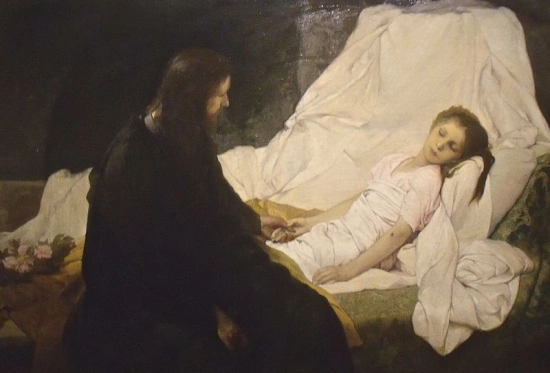1
I ušavši u lađu pređe i dođe u svoj grad.
2
I gle, donesoše Mu uzeta koji ležaše na odru. I videvši Isus veru njihovu reče uzetom: Ne boj se, sinko, opraštaju ti se gresi tvoji.
3
I gle, neki od književnika rekoše u sebi: Ovaj huli na Boga.
4
I videći Isus pomisli njihove reče: Zašto zlo mislite u srcima svojim?
5
Jer šta je lakše reći: Opraštaju ti se gresi; ili reći: Ustani i hodi?
6
Ali da znate da vlast ima Sin čovečiji na zemlji opraštati grehe (tada reče uzetom): Ustani, uzmi odar svoj i idi doma.
7
I ustavši otide doma.
8
A ljudi videći čudiše se, i hvališe Boga, koji je dao vlast takvu ljudima.
9
I odlazeći Isus odande vide čoveka gde sedi na carini, po imenu Mateja, i reče mu: Hajde za mnom. I ustavši otide za Njim.
10
I kad jeđaše u kući, gle, mnogi carinici i grešnici dođoše i jeđahu s Isusom i s učenicima Njegovim.
11
I videvši to fariseji govorahu učenicima Njegovim: Zašto s carinicima i grešnicima učitelj vaš jede i pije?
12
A Isus čuvši to reče im: Ne trebaju zdravi lekara nego bolesni.
13
Nego idite i naučite se šta znači: Milosti hoću, a ne priloga. Jer ja nisam došao da zovem pravednike no grešnike na pokajanje.
14
Tada pristupiše k Njemu učenici Jovanovi govoreći: Zašto mi i fariseji postimo mnogo, a učenici tvoji ne poste?
15
A Isus reče im: Eda li mogu svatovi plakati dok je s njima ženik? Nego će doći vreme kad će se oteti od njih ženik, i onda će postiti.
16
Jer niko ne meće novu zakrpu na staru haljinu; jer će se zakrpa odadreti od haljine, i gora će rupa biti.
17
Niti se lije vino novo u mehove stare; inače mehovi prodru se i vino se prolije, i mehovi propadnu. Nego se lije vino novo u mehove nove, i oboje se sačuva.
18
Dok On tako govoraše njima, gle, knez nekakav dođe i klanjaše Mu se govoreći: Kći moja sad umre; nego dođi i metni na nju ruku svoju, i oživeće.
19
I ustavši Isus za njim pođe i učenici Njegovi.
20
I gle, žena koja je dvanaest godina bolovala od tečenja krvi pristupi sastrag i dohvati Mu se skuta od haljine Njegove.
21
Jer govoraše u sebi: Samo ako se dotaknem haljine Njegove, ozdraviću.
22
A Isus obazrevši se i videvši je reče: Ne boj se, kćeri; vera tvoja pomogla ti je. I ozdravi žena od tog časa.
23
I došavši Isus u dom knežev i videvši svirače i ljude zabunjene
24
Reče im: Odstupite, jer devojka nije umrla, nego spava. I podsmevahu Mu se.
25
A kad istera ljude, uđe, i uhvati je za ruku, i usta devojka.
26
I otide glas ovaj po svoj zemlji onoj.
27
A kad je Isus odlazio odande, za Njim iđahu dva slepca vičući i govoreći: Pomiluj nas, sine Davidov!
28
A kad dođe u kuću, pristupiše k Njemu slepci, i reče im Isus: Verujete li da mogu to učiniti? A oni Mu rekoše: Da Gospode.
29
Tada dohvati se očiju njihovih govoreći: Po veri vašoj neka vam bude.
30
I otvoriše im se oči. I zapreti im Isus govoreći: Gledajte da niko ne dozna.
31
A oni izišavši razglasiše Ga po svoj zemlji onoj.
32
Kad oni pak iziđoše, gle, dovedoše k Njemu čoveka nemog i besnog.
33
I pošto izgna đavola, progovori nemi. I divljaše se narod govoreći: Nikada se toga nije videlo u Izrailju.
34
A fariseji govorahu: Pomoću kneza đavolskog izgoni đavole.
35
I prohođaše Isus po svim gradovima i selima učeći po zbornicama njihovim i propovedajući jevanđelje o carstvu, i isceljujući svaku bolest i svaku nemoćpo ljudima.
36
A gledajući ljude sažali Mu se, jer behu smeteni i rasejani kao ovce bez pastira.
37
Tada reče učenicima svojim: Žetve je mnogo, a poslenika malo.
38
Molite se, dakle, Gospodaru od žetve da izvede poslenike na žetvu svoju.







